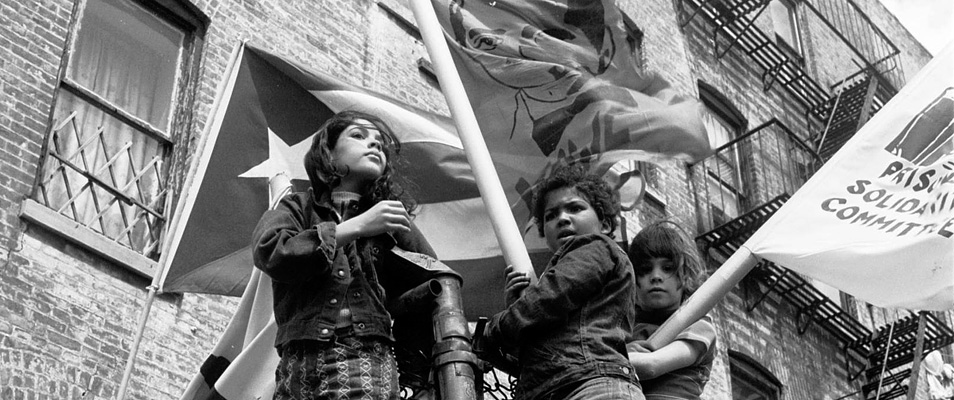By Josiah Omotosho
Forty-five years after the July 14 seizure of the Lincoln Hospital by the now defunct revolutionary group Young Lords, the Bronx Museum hosted a panel of those involved in the planning and execution of the 24-hour takeover.
The panel, part of the museum’s mixed media exhibit on the Young Lords ¡Presente!, was dominated by discussion of the group’s medical activism in general and its July 14, 1970, takeover of Lincoln Hospital in particular. “There’s a lot of rumors and stories about this,” said panelist Cleo Silver. “Tonight, we set the record straight.”
Better known for their revolutionary and socialist ideas than their medical activism, the Young Lords were instrumental in compelling Mayor John Lindsay’s administration to reform the New York City health care system for African American and Latino patients. They drafted the first Patient’s Bill of Rights, all of its tenets which, according to panel moderator and co-curator of ¡Presente!, Dr. Johanna Fernandez, are now codified in New York City law.
“When we’re talking about health care reform, we’re talking about the struggle against genocide,” said panelist Carlito Roviro, citing the use of diseases and poor health care as a weapon against Native Americans and African American slaves. “If they can attack and subdue your health, they can attack and subdue your spirit,” he said.
The panel pointed out that, in addition to lobbying political powers for reform, the Young Lords carried out numerous grassroots campaigns, including occupying a church and using it to run a breakfast program for underprivileged children, introducing acupuncture to the community as an alternative to the use methadone in treating narcotic withdrawals, holding a public burning of garbage to protest inconsistent sanitation services, and organizing door-to-door testing for tuberculosis and lead poisoning — “diseases of oppression,” according to Roviro. The takeover of Lincoln Hospital, however, might have been signature moment of the group’s medical activism.
Lincoln Hospital was the only hospital in the South Bronx during the 1960s, and, according to Silver, was “not fit for human occupation. It was called the butcher shop at the time.” With 72-hour wait times, language barriers between doctors and patients, instances of medical malpractice and numerous cases of lead poisoning, the hospital was the perfect target for the Young Lords’ brazen form of righteous anger. As such, they began to meticulously prepare for a takeover.
“We planned and planned and planned for maximum execution,” said Felipe Luciano, former Chairman of the Young Lords. They carefully surveilled the hospital, gaining the trust of security guards and orderlies, and recruited the “good will of doctors putting their licenses on the line”, according to panelist Miguel Melendez.
In the early hours of July 14, 1970, Young Lords took over the nine-story Lincoln Hospital building, occupying it in seven minutes. Within 15 minutes, they had begun setting up tuberculosis and lead poisoning detection clinics, as well as day care and withdrawal treatment centers. They would run these health programs for 24 hours before the NYPD surrounded the building and negotiated a peaceful de-occupation, ending the takeover. It was a city-wide sensation and, according to the panel, had near-immediate effects on the New York City health care system.
“It emboldened all oppressed people,” said Rovira. “They saw on the news these crazy Black and Puerto Rican kids taking over a hospital. It was unheard of.”
“This was important because we took an institution,” said Luciano. “And we weren’t afraid to die.”
Despite the lasting effect of the takeover — including the reformation and expansion of Lincoln Hospital which now carries one of the city’s finest emergency departments — the panel was quick to point out that the struggle, for both health care reform and reform in general, is far from over. Calling for universal health care, Silver said, “Health care is a right, not a privilege.”
“The new society is not going to come by depending on the Democratic Party,” said Rovira, to laughs from the audience, before declaring, “We need a revolution.” The panel itself was dedicated by Dr. Fernandez to “our political prisoners, because the struggle still continues.”
But perhaps most pointed of all the calls for grassroots, reform-oriented movements came from former Lords chairman Luciano who claimed, “You are a slave and you are colonized, and unless you fight for your freedom, it’s not happening. Either you take your freedom, or you shut the hell up.”
Home page image: Maximo Colon, Untitled, c. 1970, Digital print, Courtesy of Maximo Colon








